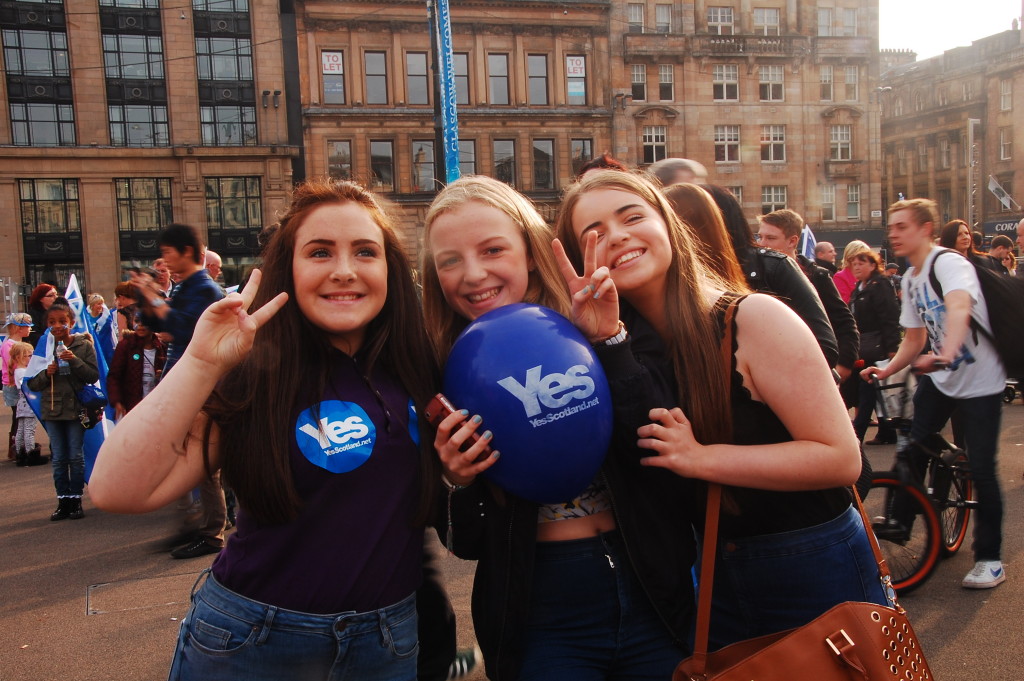The Scottish Referendum shows it’s time to give 16 year olds the vote
Ross Greer, Green Party candidate for East Dunbartonshire and former Communities Coordinator for Yes Scotland, on how the Scottish Referendum shows that Scotland – and the UK – is ready for votes at 16. Originally published in The National, a pro-independence Scottish newspaper.

Much has been written about the changes the referendum brought to UK politics. One of the most concrete changes was in moving the voting age to sixteen, a principle which was initially resisted by the Westminster parties but which was not only conceded for the referendum but now for future elections to the Scottish Parliament as well.
The arguments for and against votes at sixteen were well rehearsed in the lead-up to the Edinburgh Agreement but are worth repeating. We give sixteen and seventeen year olds a number of individual rights and responsibilities in society but not the ability to have any say over how that society is ran. They’re taxed but can’t vote for the party whose tax policies suit them best. They can live independently but have no say over housing policy. Most are in full time education but have no control over changes in education and they can join the UK armed forces (despite international criticism). but have no say in defence or foreign affairs. This last point is usually countered by highlighting that sixteen year olds don’t serve on the frontline but it’s still the sixteen year old making the decision which could lead them to a warzone.
Until September this was defended on the grounds of a lack of maturity or knowledge but that argument just doesn’t stand any longer. Teenagers voted in huge numbers but it wasn’t turnout which vindicated those of us who had campaigned for so long on this issue. Engagement from new voters was far better than what I experienced working with any other demographic in my time as Yes Scotland’s communities coordinator. Tribal politics was non-existent. Debates were about getting the answers needed, not scoring partisan points against whichever side they disagreed with. Animosity and uncontrolled emotion were also largely absent. The passion was there but it was rational, thought-through and constructive. The best debates I took part in during the campaign were all in high schools, with these new voters.
It all contrasts sharply with May, where these same young people will be prevented from voting. They’ll ask why they could take part in the most important decision in the UK’s history but are not considered able to elect their local MP. There is no good answer to this question, the referendum has changed the game completely and proven that votes at sixteen doesn’t just work, it is a success by every measure.
I was proud to lead on the Scottish Youth Parliament’s campaign for Votes At 16 in the period before the Edinburgh Agreement and whilst those of us in the trenches during the campaign were throwing everything we could at victory, the SYP deserves huge credit for ensuring that young people were registered, informed and confident in the decision they were making. The challenge now is to make that success permanent. In 2016 a new generation of sixteen and seventeen year olds will be able to vote for the first time (assuming this key promise is kept by Westminster). Those of us involved in party politics owe it to them to have the same dignified, substantive and passionate debate we’ve just experienced. We’ve proven that democracy can be normal and enjoyable. If we can do it again, it may ensure that these young people become regular voters.
Politics should be something young people feel part of, not something which is done to them. We’ve learnt how to do that and now we can put it into practice.



Leave a Reply